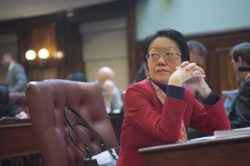
Council Member Margaret Chin. Image credit: NYCC/William Alatriste
An amendment to expand ground floor retail use received harsh criticism from Council Members, tenants, and the community board. On May 30, 2017, the City Council’s Subcommittee heard testimony on an application to expand the Special Little Italy District to abolish rear yards to expand retail use. The applicant, JBAM TRG Spring LLC, proposed to build a one-story addition to the rear yards of 55-57 Spring Street—eliminating empty ground floor residential units—to create an expanded covered space for retail use. The building owner had agreed to move yard facilities to the roofs of the buildings if the application were approved.
Council Member Margaret Chin began the hearing by stating, “I have strong objection with this application.” The buildings once housed rent protected tenants, but in recent years many of the units had become market rate. She was not convinced that the project was in the best interest of the neighborhood. She urged the subcommittee to deny this proposal. Chin also called on any rent regulated tenants to inform her office if they are pressured to remain silent on the issue.
Daniel Egers, of Greenberg Traurig LLP, spoke on behalf of the applicant who did not attend the hearing. In response to Chin’s opening statement, Egers stated in the two years that his client has owned the building only three units had been deregulated, and those were properly deregulated. Egers also stated that he was unaware of any improper pressure to silence rent regulated tenants.
Council Member David Greenfield questioned what benefit the community would receive, he characterized the changes proposed by the applicant as concessions rather than benefits. Egers responded that currently there could be a restaurant or bar on the ground floor, but if approved his client would not make such an application. Greenfield responded, “To be clear, the benefit you’re offering is that things could get worse, but they won’t get worse if we do this.” He later remarked, “It sounds honestly more like a threat than a benefit.”
A representative of the community board testified in opposition of the applicants, arguing that the applicant could not come up with a better land use justification to build a structure over a required rear yard other than lots near the property could do it. She also stated that the applicant had offered to drop an eviction proceeding against a rent-stabilized tenant in exchange for approval by the community board. Citing claims of tenant harassment as well, the representative stated that the applicant’s behavior cannot be rewarded with additional retail space.
A rent stabilized tenant of 55 Spring Street testified against the proposal as well. The tenant stated that she had been a resident of the building for 37 years, and that it was her observation that the building is fragile. She noted that over the years when renovations were done, cracks would be created throughout the building. She had also witnessed ceilings falling and feared further construction would permanently damage the building. She claimed that all work done on the building to date had been done by illegal crews, and that a union construction crew would never agree to the work.
A representative of the Manhattan Borough President testified that her office was withdrawing its previous approval of the proposal. The representative cited investigations done after the President’s approval showing tenant harassment, unhealthy levels of lead on all floors of the buildings and unpermitted construction work. She stated that the President’s office had been misled by the applicant as to its intention for the space.
Several other members of the public and community organizations testified against the project. No member of the public testified in favor.
The application was laid over by the subcommittee.
CC: 55-57 Spring Street Text Amendment, Manhattan (LU 0653-2017) (May 30, 2017).
By: Jonathon Sizemore (Jonathon is the CityLaw Fellow and a New York Law School Graduate, Class of 2016).

